Economic Justice



Jesus was quite clear that our allegiance was to be with the POOR, not the barons of Wall Street.
God's laws are immutable Gravity. Aging. Those sorts of things. We cannot change them. But we DO know that mere humans MADE UP the laws of the market economy and we don't have to follow its rules. We can choose to, but it’s a choice.
The rules that run our capitalistic system were invented by us. And we really do not have to play by those rules.

Venture capitalist Tom Perkins took a beating by his former employer for likening today’s class warfare to the Holocaust, with the mega-wealthy 1 percent as victims of “Nazi” repression.
In what The Wall Street Journal obediently termed a “Progressive Kristallnacht,” the grand old man of Silicon Valley said those who criticize wealth inequality are like Nazis pursuing “class demonization.”
The firm he founded, known as Kleiner Perkins, immediately disavowed the 82-year-old Perkins, saying, “We were shocked by his views expressed today in the WSJ and do not agree.”
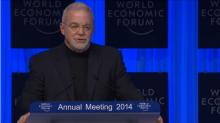
"We are perhaps among the most included in this global economy. So how will the most included reach out to the most excluded this year?"
Editor’s Note: The following text and video is from Jim Wallis’ closing talk at the World Economic Forum in Davos, calling those in positions of leadership to implement values that benefit the common good.
In our opening session for this 2014 annual meeting, we heard a letter read to us from Pope Francis, a leader who has captured the attention of the world. He called us here to “deeper reflection” and to “reshaping the world.” He said something quite striking, “I ask you to insure that humanity is served by wealth and not ruled by it.”
So, to that deeper reflection: I believe that for many of us here at Davos, there was a moment — a remark from a session, a smaller discussion, a meal interaction, a personal conversation, or a walk in the snow — that made us think and feel some things we don’t normally focus on in our day-to-day environment back home. It could have been an insight, a new angle or framework, a challenge, or a reminder of things lost — something that struck you more deeply than just more talk and made an impact on you. Often these insightful moments are about our values, or challenge our values, or bring us back to a moral compass that we have, or would like to have, or miss from earlier in our lives.

Last week marked the fourth anniversary of the landmark Supreme Court case Citizens United v. Federal Election Commission. In a 5-4 ruling, the court ruled that corporations are entitled to the same free speech rights as individual humans as guaranteed under the First Amendment.
The political repercussions of Citizens United include the rise of “Super PACs” — political action committees that can raise and spend unlimited amounts of money, independent of direct campaign contributions, to influence politics. The power yielded to such corporations, as well as indiscriminate spending allowance, has deleterious effects upon our democracy.
Because money talks, big money will talk a lot louder, drowning out the voices of average Americans trying to exercise their own civic rights. Politicians are undoubtedly more apt to respond to the requests of companies that shelled out hundreds of millions of dollars on supportive campaign politics than to the needs of a college graduate or working family who donated 10 bucks. Doesn’t exactly smack of sound democratic governance.

A recent report by OXFAM offered some sobering data about both the concentration and flow of wealth in the world today. A few key points, also summarized by a new business article on The Atlantic website , include:
- The richest 85 people in the world control as much wealth as the poorest 3,000,000,000 people;
- Nineteen out of 20 “G20” countries are experiencing growing income inequality between rich and poor;
- In the United States in particular, 95 percent of the post-financial-crisis capital growth has been amassed by the richest 1 percent of Americans;
- While domestic income inequality continues to grow, the income tax rates for wealthiest Americans have steadily dropped.
My first reaction to seemingly immoral concentrations of wealth, and the systems that enable it, is anger and a compulsion to call them out, to change them and to distribute the world’s treasures evenly among all of God’s people.
But what if we need the insanely wealthy to realize a kingdom-inspired vision for our world?
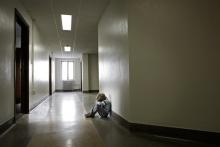
Despite all the modern conveniences of the 21st century, our information-saturated culture, an exhaustive supply of self-help books, and giant advances in medical technology, doesn’t it seem like our society is more stressed, our anxiety higher, and more of our kids prescribed behavior modification drugs?
What if one of the reasons for our strung-out culture was the social, emotional, mental, and physiological outworking of the effects of poverty?
In the latest release of the Shriver Report, Dr. Nadine Burke Harris, founder of the California Pacific Medical Center’s Bayview Child Health Center, has found through medical research and experiences of her patients that the stress of poverty can be manifested in alarming behaviors and predispositions.

There’s an absurd character in The Little Prince by Antoine de Saint-Exupéry who reveals more about our capacity for self-delusion than we might want to admit. He’s called the King and when it comes to desire, he is as deluded about his own power as we are about ours. The King’s delusion is this: he believes that the movements of the sun, moon, and stars are the result of his commands. That’s right – the sun rises and sets because the King commands it to be so. Our delusion is nearly identical: we believe that we are the source of our desires, that they arise and fall at our command. Because of our shared delusions, we and the King are quite out of touch with reality. Remarkably, the cure for us is also the same – spending some quality time with the Little Prince.

SNAP began in 1964 when President Lyndon B. Johnson signed the Food Stamp Act as part of his unconditional “War on Poverty.” In his remarks upon signing, Johnson said: “I believe the Food Stamp Act weds the best of the humanitarian instincts of the American people with the best of the free enterprise system. Instead of establishing a duplicate public system to distribute food surplus to the needy, this act permits us to use our highly efficient commercial food distribution system.”
Johnson continued: “It is one of many sensible and needed steps we have taken to apply the power of America's new abundance to the task of building a better life for every American.”
Imagine. Fifty years ago the Food Stamp Act was viewed not as charity, but rather as an ingenious utilization of American enterprise in order to help “build a better life for every American.”
And it is genius.
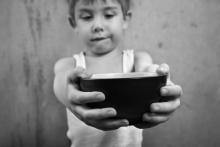
The central figures in four of the planet’s largest religions – Christianity, Islam, Buddhism, and Judaism – were all once homeless. Moses was encamped in the Sinai, unable to return to the Promised Land. Jesus was born in a manger. Buddha wandered through the wilderness seeking enlightenment. The Prophet Muhammad was forced out of Mecca.
Is it a coincidence that each of these figures was, at key parts of his life, dispossessed from the society around him? Hardly. This is a clear message that even the most powerful can be made powerless.
In both Leviticus and Deuteronomy, believers are directed to give a set portion of their harvest to people in poverty and immigrants. It is neither voluntary, nor are the amounts to be based on charitable whims. It is a commandment to automatically give a specific percent, making it an anti-hunger tax of sorts. In fact, both the Old and New Testaments make it clear that justice is a higher calling than mere charity.
In Mathew 25, not only does Christ proclaim that those who clothe, house, and feed the “least of these” are engaging in acts equivalent to directly aiding the Lord, he also preaches that those who refuse to aid the poor are consigned to damnation.
Most secular ethical traditions also make societal actions to reduce hunger, poverty, and homelessness a centerpiece of their teachings.
Virtually every elected official in Washington claims to abide by these ethical and faith-based traditions. Indeed, many have used their professions of faith to advance their political careers.
Yet many of these same leaders repeatedly take actions opposite to the values they espouse.

The only way to win the “war on poverty” is for liberals and conservatives to make peace — for the sake of the poor. That would be the best way to mark the 50th anniversary of the war on poverty, declared by President Lyndon Johnson in his January 1964 State of the Union address. Making peace means replacing ideologies with solutions that actually solve the problems of poverty. With both Republicans and Democrats speaking out on poverty this week, and the recession slowly receding this should be an opportunity to find the focus, commitment, and strategies that could effectively reduce and ultimately eliminate the shameful facts of poverty in the world’s richest nation.
For any proposal, the basic question must be whether it helps more people and families rise out of poverty and realize their dreams. This means setting aside political self-interest and thinking beyond our too often inflexible ideologies.

It’s a new year, and Congress is back in session.
One of the top issues expected to be debated in 2014 is a hike to the federal minimum wage. 13 states have instituted wage increases. President Obama has supported raising the minimum wage throughout his presidency. Most recently, he shared his approval of new legislation proposed by Sen. Tom Harkin and George Miller (D-Calif.) that would raise the minimum wage to $10.10, up from it’s current $7.25.
Critics of the Harkin/Miller bill are quick to decry any wage increase. The usual arguments are trotted out to combat progressive pay for low-wage earners. Here are five commonly perpetuated myths about minimum wage. Hopefully, their exploration will shed a more accurate light on this contested issue.

I stood in line and waited until they called my number.
“Neeeext,” the woman behind the counter called!
The woman put out an energy that dared anyone to cross her, challenge her, even speak to her. She gave me a pile of papers to fill out “over there,” she waved her hands dismissively in the general direction of all the other losers sitting in rows of old school desks — the kind where the chair and the desk are attached. They were all fully engrossed in one task: filling out their unemployment insurance applications. I joined them.
Of course we weren’t losers, but it felt like we were. We were grown adults. We represented many races: white, black, Latino, and Asian. We represented a small fraction of the sea of people who were out of work at the height of the economic crisis. If you had come to us only weeks before we were school teachers and firemen, opera singers, Wall Street brokers, and justice advocates (like me). But now we were all numbers, experiencing the same humiliating moment together.
But, how much more humiliating it would have been to be thrown out of my apartment? How much more dehumanizing would it have been to become homeless or go without food?
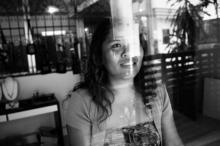
A small delicate silver cross hangs around Mint’s neck, a charm she reaches for nervously from time to time as she speaks.
Mint is her nickname, an Anglicized version of the long Thai name she was given and would rather not make public. As a former prostitute, the 24-year-old is concerned about bringing shame to her family, though she says everyone in her village in the northeastern province of Issan — a poor agricultural region along the border with Cambodia and Laos — would assume, or simply know, she had to be doing sex work to send money back home.
Everyone in Bangkok knows how it works. Many of the countless massage parlors, go-go bars, and karaoke joints peppered throughout the city are frequently thinly veiled fronts for prostitution. Heavily made-up girls hang around in the periphery of joints catering to Western tourists.
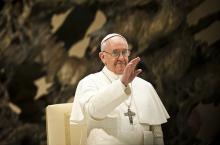
Pope Francis, in his message for the World Day of Peace on Jan. 1, stresses the concept of fraternity as the basis for a moral economy, moral society, and moral relationships among nations.
A longing for fraternity, the pope argues, lives within every human heart.
In the heart of every man and woman is the desire for a full life, including that irrepressible longing for fraternity which draws us to fellowship with others and enables us to see them not as enemies or rivals, but as brothers and sisters to be accepted and embraced. Fraternity is an essential human quality, for we are relational beings. A lively awareness of our relatedness helps us to look upon and to treat each person as a true sister or brother; without fraternity it is impossible to build a just society and a solid and lasting peace.
Too often, Pope Francis explains, this human desire for fraternity has been undermined by other human inclinations, those of selfishness, envy, and greed. He argues that those inclinations form a poor foundation for human societies and economies, and that we must build a foundation for society and the economy based on the “transcendent dimension” of humanity:
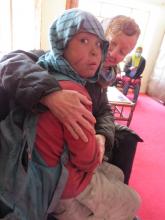
Kabul, Afghanistan, is “home” to hundreds of thousands of children who have no home. Many of them live in squalid refugee camps with families that have been displaced by violence and war. Bereft of any income in a city already burdened by high rates of unemployment, families struggle to survive without adequate shelter, clothing, food, or fuel. Winter is especially hard for refugee families. Survival sometimes means sending their children to work on the streets, as vendors, where they often become vulnerable to well-organized gangs that lure them into drug and other criminal rings.
Last year, the Afghan Peace Volunteers (APV), young Afghans who host me and other internationals when we visit Kabul, began a program to help street children enroll in schools. The volunteers befriend small groups of children, get to know the children’s families and circumstances, and then reach agreements with the families that if the children are allowed to attend school and reduce their working hours on the streets, the APVs will compensate the families, supplying them with oil and rice. Next, the APVs buy warm clothes for each child and invite them to attend regular classes at the APV home to learn the alphabet and math.
Yesterday, Abdulhai and Hakim met a young boy, Safar, age 13, who was working as a boot polisher on a street near the APV home. Abdulhai asked to shake Safar’s hand, but the child refused. Understandably, Safar may have feared Abdulhai. But when Abdulhai and Hakim told Safar there were foreigners at the APV office who were keen to help, he followed them into our yard.

I recently watched Eugene Jarecki’s remarkable documentary, The House I Live In, which is about the American ‘war on drugs’ and the burgeoning prison population it engendered and continues to engender.
Rarely do I find myself murmuring and tsk-tsking during a movie, but this one was highly affecting — an intimate look at how history, racism, economics, and politics have created a system that no one is proud of and no one really likes. Even the cops and prison guards who claim to love their jobs express unease with the human suffering and unbalanced scales of justice that lead to it.
One particular story has stayed with me.
A man named Kevin Ott was found in possession of a small envelope of meth; prior to that he’d been arrested twice, again for possessing small amounts of illegal drugs (meth and marijuana).
He’s been in prison for seventeen years. And he will be there until he dies: Ott is serving a life sentence without the possibility of parole. Because he was a three-time offender, his state’s mandatory sentencing laws required that he be put away for life.
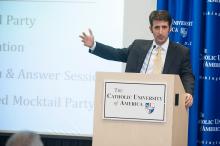
Dozens of Catholic leaders are protesting the decision by the Catholic University of America to accept a large donation from the foundation of Charles Koch, a billionaire industrialist who is an influential supporter of libertarian-style policies that critics say run counter to church teaching.
Charles Koch and his brother, David, “fund organizations that advance public policies that directly contradict Catholic teaching on a range of moral issues from economic justice to environmental stewardship,” says a four-page letter to CUA President John Garvey, released Monday.
The letter was signed by 50 priests, social justice advocates, theologians, and other academics, including several faculty at CUA in Washington.
With just a few days to go before Christmas, many Americans will be rushing around completing their Christmas preparations: doing their last minute shopping, finalizing travel plans, figuring out how to deal with awkward family dynamics. In many cases, they will be faced with what is popularly known as #firstworldproblems — problems of inconvenience of a privileged and affluent people: delayed flights, out-of-stock gift items, spotty cell phone coverage.
At the same time, many people, hidden amidst the consumer celebration that Christmas has become, will be struggling just to find their next meal, shelter, community, and hope.
Striking census bureau statistics released earlier this year paint a picture of an expanding American underclass, with 15% of Americans living at or below the poverty-line, 23% of children (the highest percentage of poor by age) living in poverty, and the evaporation of the American middle class.
On the one hand, at this time of year, our society is more aware of the poor. Holiday food collections, toy and clothing drives abound, as does the ubiquitous ringing of Salvation Army bells. And yet, in many ways the plight of the poor is more hidden by the bright lights and rush of the season.